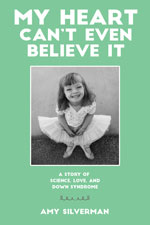
Breathing Lessons, Part 2
posted Thursday February 26th, 2009
I wanted to write about the science fair today, or maybe how I’m mad at the PTA, but I figure it’s best to get all the really sad stuff off my chest now.
The bad pun’s intended, sort of. These days, it’s all about lungs.
For a while, in our house, it was all about hearts. Sophie had heart surgery twice before she was five. I’m not a religious person, but I looked for messages. The morning of the first surgery, when Sophie was four months old, they put us in an exam room — more like a holding cell — in the surgery prep area at Phoenix Childrens Hospital.
Did you know there’s an entire industry devoted to signage and design in hospitals, and, particularly at childrens hospitals, art? I walked into that tiny room and there on the wall was a drawing of a little girl holding a big, bright red heart.
The tears I’d fought back all morning welled up. I knew who the artist was before I looked: a woman named Rose Johnson, whose work for New Times I liked so much I commissioned her to do the artwork for our wedding program.
It was a sign. So what do the events of the last year mean?
Last May, my dear friend Cheryl broke the news that her longtime companion was in the final stages of lung cancer. In June, my mother-in-law received a similar diagnosis. In August, my grandfather drew his last breath — days later than he should have, because someone had turned the oxygen up too high for a 94-year-old man who was supposed be in hospice.
And in January, Jordan Sterling died. Growing up, I always sort of knew who the Sterlings were — the kids were a little younger, went to different schools, but our moms took ballet together (really) and we had mutual friends. Phoenix is not a large place, at least it wasn’t back then.
When I moved home, I worked for years with Jordan’s stepmother, Terry Greene Sterling, now a very close friend and mentor. So I heard a lot more about the Sterlings. Mostly, I have to admit, about their health. At my wedding, Terry wore a bright red suit and read a lovely, funny piece she’d written about how Ray and I met. (She introduced us.) Then she had to rush off; Jordan was in the hospital again.
There are three Sterling kids. Two were born with cystic fibrosis. I’m honestly not sure how vigilant the testing is these days for the genes that match up and give it to your baby. Thirtysome years ago, I think it was non-existent. So the Sterlings had no idea, til all three kids were born (the eldest is the one who doesn’t have it) that two had it.
Cystic fibrosis is a death sentence. The fact that Brooke and Jordan made it to their mid-30s is a testament to medical science, their families and their own incredible strength. The two took different paths, which I find fascinating. (You can read my friend and former colleague Megan Irwin’s story about the family here: http://www.phoenixnewtimes.com/2006-08-10/news/borrowed-time/)
Despite their disease, both Brooke and Jordan have had amazing lives, filled with friends and adventure, but also focused a lot on health. Brooke is all about the natural — she runs a yoga studio, sees a naturopath, worships her body. Jordan took the medical route: he had a double lung transplant years ago. For a while, it worked. But the anti-rejection drugs shot his kidneys and I don’t more detail than that other than the guy had something like 15 hospitalizations in a year. He died still hoping for a lung/kidney transplant.
At the funeral, I couldn’t look at his mother.
The night Jordan died, Terry left me a voicemail I heard right before bed, and as I tried to go sleep, I couldn’t get the thought out of my head: How could you live with yourself, knowing you’d brought this child — these two children — into the world with this horrible disease that would ultimately, quite literally, smother them?
And then, like a flash of lightning (really, I know it sounds dramatic, but that’s what it was like) I thought, “SOPHIE.”
My — our — situation isn’t so different.
No, Sophie does not have cystic fibrosis. And yes, I know, I’m opening myself up for attack, for daring to question the decision to bring a baby with Down syndrome into the world.
But this is not about her brain. So often, people think that’s all it’s about. What I’m thinking about is her heart. We were so lucky the doctors were able to fix it — twice. There could be a third time. And what about the other risks? Sophie was home the past two days with a fever, and I can’t say I didn’t stare at her yesterday and wonder, “Leukemia?”
(She’s fine today.)
A lot of days I stop and ask myself, “What if I brought this amazing little person into the world and she dies an early, painful death because of my decision (or lack thereof)?”
How could I live with myself?
But really, I think, the bigger question is this: How can anyone ever have a baby and live with all the potential consequencesthat will follow that person around his or her entire life?
Maybe it’s best to take a deep breath and focus on something else, like being mad at the PTA.







When I found out I was pregnant two years ago at 40, I freaked out. What if my job working with disabled adults was only preparing me for a lifetime of living with a child with disabilities? What if I was too old to have a baby? I spent my entire pregnancy freaking out (even though I had had every test known to man, some thrice-over due to my doctor’s freaking out also).
You know what?
Every minute with your kids is a minute you should cherish. Nobody knows how long they have here on earth – abled, disabled, whatever. What if you walk across the street and get hit by a car? You can’t prepare for that sort of thing, you just don’t know.
Just love her and don’t worry about the what ifs. You don’t have time for that.
Now, I want to hear the bitching about the PTA, get on it.
Amy you just summed it all up. Being a parent is about opening your heart to risk and unknowns.
That’s part of the reason all these “advances” in genetic testing make me feel a little squishy. I mean, I’m pro-choice but with all this testing, I think people have become increasingly interested in taking the risk out of parenthood and guess what folks? You can’t. So until they can do prenatal testing for future fatal teenage car wrecks and drug overdoses, I’ll remain skeptical that prenatal testing is the catch-all/save-all.
Didn’t mean to get off topic there but just also wanted to add that I don’t think you realize that until you are a parent just how terrifying it is and by then it’s too late to give the kid back : ) . I think if more people knew how scary it is to love your kids, they might not become parents at all. I didn’t know I could love anybody the way I love my children The risk of losing them is horrifying if I think about it but the simple truth is that nobody knows what is going to happen to them or their children this afternoon, tonight, tomorrow…we just have to live the best lives we can and be the best people we can be.
Didn’t mean to get all heavy. That’s why I choose to focus my anger on the PTA and misplaced backpacks.
Hi, I’ve been reading your blog for a while now and I’ve learned a lot from your writing. We’re struggling to get pregnant, thus do not have any kids yet.
I’ve struggled with some of the questions in this post myself (our higher age increases the risk of having a special baby).
One of the comments left on my post was in the line of: what if you have a normal baby and something happens afterward? Like CP in afterbirth care?
There is no way to know how your children will turn out in the end. You can only hope for the best and keep on doing what you can.
Best of luck, keeping you in my prayers.
It’s a trope in nineteenth-century sentimental literature that some children are just too good, too angelic, for this world. Think “Little Women” or “Uncle Tom’s Cabin,” and you’ll remember the perfect angel dies young. I never thought about those perfect angels as metaphors for DS kids, but maybe that’s what all those sentimental 19th-century writers were thinking of.
I think if I had some illness, I wouldn’t blame my parents. At least I hope I wouldn’t. I try to appreciate all my parents do for me and I try to take responsibility for myself. I hope my kids will do the same.
Short of having a child commit suicide — and that’s the toughest thing I know, I don’t know any parent who has gotten over that, (I’ve only known a few who have even had to try to get over it) and I don’t know how anyone ever could get over that — anyway, short of a child committing suicide, most of the other problems our kids face are random quirks of fate and chance and happenstance, uncontrollable. (I know, suicide is probably uncontrollable too, but somehow in the case of suicide I think irrational parental guilt goes off the charts.)
I know this doesn’t really address the issue of having to choose whether to bring a child into the world with a genetic abnormality — but all our kids face random threats, and all we can do is let go and hold on.
They’re not going to be safe. The best we can give them is that Buddhist saying (from new agey Americanized Buddhism): pain is inevitable, but suffering isn’t. Random pain will happen, we can’t control it, all we can control is our own reactions to it.
Though I’m not a parent and cannot 100% appreciate how painful thoughts like that can be, I do know that everybody dies, and some of us suffer illness and/or pain in the process, whether it’s at the age of 25 or 95.
Some of my friends and family who’ve died rather young and/or who have or had chronic illness wound up experiencing as great a degree of adventure and pleasure in their lives as anybody else (maybe more, for the ones who knew in advance).
We look from an outsider’s perspective at people we miss and grieve for, and we sometimes think a longer and/or easier life is what they deserved. But (unless there’s someone we want to stick around and take care of) most of us could, I hope, look at our own life at any moment and say, “This could be the last moment, and that would be okay.”
At least I try to live like that . . . and when I think of the people I love who enjoyed having me around, I wouldn’t want to have deprived them of that, either. (Though at a certain point it all gets pretty hypothetical, Amy — it sort of makes no sense to wonder whether someone would prefer never to have been born.)
And of course every parent second-guesses herself about everything, too, and y’all need to forgive yourselves.
the very best of luck to you krista!!!!! amy